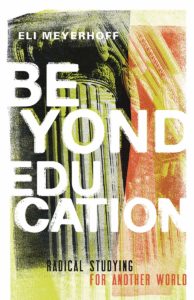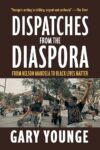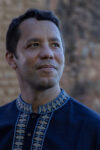
[University of Minnesota Press; 2019]
“Bargaining for the common good” has been the refrain of the recent teacher strikes in West Virginia, Los Angeles, Chicago, and elsewhere. In 2018, teachers in West Virginia demanded a five-percent, across-the-board raise for all state employees – and got it, despite formidable GOP opposition. A year later, the United Teachers of Los Angeles demanded smaller class-sizes and a city-wide moratorium on charter-school development – and got them, prolonging their strike in order to do so. In October, the Chicago Teachers Union struck unrelentingly for 11 days until City Hall agreed to put healthcare and social workers in every school building. What made these common-good demands achievable was teachers’ consciousness of their strategic bargaining position. Education workers have disproportionate political-economic leverage, relative to their number, because our current form of society cannot fully function without them. As journalist Eric Blanc observes in Red State Revolt, teacher strikes are powerful because the temporary crisis they create is not just economic but social: Every day that teachers are not in classrooms is a day that students are not in school, a day that essential child supervision and pedagogical services are unavailable to working people, employers, and the state. Moreover, teachers understand the extent to which public education, as part of the process of societal reproduction, depends upon other public goods to function. Chicago teachers in particular built their strike upon this insight, increasing public awareness that healthcare, housing, and nutrition have a major causal bearing on school performance.
Another insight that has come out of this moment of heightened education militancy is that the fundamentally coercive aspect of schooling – the fact that it is universal and compulsory for all children up to a certain age – is the crux of teachers’ political-economic leverage. The recent strikes would have been much weaker, if not altogether impossible to carry out, if the vast majority of children did not attend state-run schools. Yet it is also the case that public education suffers from some serious structural pathologies. The policy of “separate but equal” schools for whites and blacks, de jure from 1896 to 1954 and de facto today, reveals the persistent challenges facing the egalitarian movement for public education spearheaded by American blacks since Reconstruction. Today, public schools in many lower-income districts effectively serve as pre-carceral holding cells for young people labelled behavioral delinquents. Private-sector actors, exploiting these structural inequities, lobby legislation that siphons monies out of “low-performing” schools into privately managed charters that perform no better than their public counterparts yet which yield substantial profits for their investors. Our situation is one, therefore, in which education is simultaneously both a source of class solidarity and an instrument of social alienation. Can the paradox ever be resolved?
I will keep this question in mind as I review Eli Meyerhoff’s Beyond Education: Radical Studying for Another World, a richly researched and politically provocative book that discloses some of the unexamined habits of mainstream educational thought. The author takes an “abolitionist” stance toward education and imagines alternative forms of “radical studying” through which the human activity of world-making can be realized. On one hand, Meyerhoff argues that we must think beyond education, out of consideration for the role it plays in reproducing a capitalistic order that is unresponsive to the injustices that issue from it. On the other hand, he argues that going beyond education requires going through it, appropriating its material resources for social movements that subvert the hegemonic order. Its defining abolitionist project of going through while going beyond, of being “in but not of” education, makes Meyerhoff’s book difficult to place into one ideological camp. The author’s bold iconoclasm toward canonical leftist thinking about education is the source of much of what is vital in the book. That said, such iconoclasm is also the source of some rather heady claims that should be thoughtfully considered yet decisively challenged.
In the introductory chapter, Meyerhoff distinguishes the historical phenomenon called “education” from the natural phenomenon called “study.” Education is a “mode of study,” one among many possible modes in which human beings can “devot[e] attention to the world.” A mode of study is comprised of the means of study (texts, tools, concepts, etc.) and the relations of study (formative mentorships, social support networks, etc.). “Mode of study” is supposed to function as a non-ideal, descriptive concept devoid of all normative content. For Meyerhoff, there is no “ideal” or “natural” mode of study – only plural, actual modes that come to be as a result of human agency. The concept “is open to either positive or negative normative valences,” distinguishing it from critical theories of education that tend to “promote a particular mode of study as a normative ideal…while insufficiently engaging the controversies about the contrasts and conflicts between that normative ideal and the form of education that they oppose.” Consequently, even well-intentioned educationists foreclose the possibility of self-criticism “by associating their normative ideal with a constellation of normatively positive concepts.”
The task for critical educationists, then, is to examine the presupposition that education is an unassailable good by looking to the conflict-ridden historical process by which it took shape. Meyerhoff explores the historical origins of seven features of the education-based mode of study, one of which is a “vertical imaginary” in which the student passes through hierarchically ordered levels of schooling en route to individual self-actualization. The book’s genealogical chapters deromanticize this educational “narrative of ascent” by linking its verticality to capitalistic social relations. The author traces the origins of education’s verticalism to late-feudal Lower Germany, specifically, to a Christian sect called the Brothers and Sisters of the Common Life. “The [sect’s] imaginary of a spiritual ascent up the levels of schooling provided…an ideological mechanism for maintaining order and preventing subversive, cross-class, cross-age relationships,” writes Meyerhoff, making education a natural ally of capitalism from its inception. A more recent manifestation of the alliance of education and capitalism can be found in the so-called “dropout crisis,” a relic of JFK-era education policy that views school completion as a measure of societal health. According to Meyerhoff, policymakers have used the “dropout crisis narrative” to control non-compliant students, funneling them into low-wage job programs or into prisons that exploit their valuable labor-power virtually for free. The high-school dropout is, in many respects, a contemporary cousin of the colonized subject – an insight that Meyerhoff’s genealogical method brings into full relief.
One of the book’s virtues is the sustained attention it gives to how levels-based schooling has been complicit in, or has actively contributed to, past and present social problems. The book briefly recounts the history of indigenous boarding schools in North America, racialized school segregation in the U.S., and U.S. universities’ investment in slavery and its legacy institutions. Several chapters engage Indigenous and Black-radical critiques of U.S. education policies, searching these traditions for alternative visions to state-run compulsory schooling and the corporatized, land-grant university. As part of this engagement, the author censures uncritical valorizations of public education that diminish its conflict-ridden history with minority populations. He also contends that educationists should replace their “school-to-prison pipeline” theory with an “educational-carceral nexus” theory that compares the structural homologies of schools and prisons. Under this new critical framework, educational and carceral institutions are viewed as co-constitutive” elements of one “settler-colonial, liberal-capitalist” system, meaning that schools and prisons are logically, not coincidentally, linked.
Meyerhoff’s “education abolitionism” is influenced by prison abolitionism. As I understand it, abolitionism in the context of education has at least two tenets, one philosophical, one political. The philosophical tenet is to view education as a historically contingent mode of study, one from which we must free ourselves intellectually in order to begin to imagine alternatives. The political tenet, stemming from the philosophical one, is to engage in “movement-embedded study” that challenges education’s unquestioned hegemony over human development. Education abolitionism asks us to labor within existing institutions while redirecting their resources toward subversive aims – in the author’s words, to be “in but not of” education. Meyerhoff’s signature illustration of this is the Experimental College of the Twin Cities (EXCO) on which he worked while a graduate student at University of Minnesota. EXCO activists appropriated student-activity monies from several area universities in order to fund a free, open university organized and implemented by community members. Following Fred Moten and Stefano Harney, Meyerhoff likens EXCO’s institutional model to a kind of organized “theft,” its goal being to establish an intellectual “undercommons” alongside the financially enclosed, academically shuttered public university.
Although I think Beyond Education makes a laudable contribution to critical educational studies, I have a few points of contention regarding the author’s conception of the education-based mode of study. Meyerhoff’s genealogies bypass a crucial era of educational institution-building in Europe, namely the mass schooling policies of eighteenth- and nineteenth-century Prussia. What the Prussian monarchy achieved became a model for many other countries, including the United States. When we take this into account, Meyerhoff’s generalizations about modern educational thought miss the point somewhat. For example, the author claims that a “dichotomous” metaphysics that opposes “humanity” to “nature” underwrites the education-based mode of study. This is true in the cases he selects but not in the Prussian case. The philosophical watchword of Prussian education under Wilhelm von Humboldt was Bildung, a concept that is usually equated with education but which carries a much broader connotation than its English analogue. In later-Enlightenment biology, Bildung referred to the natural genesis of organisms in general, describing the bodily processes of minded and non-minded beings as they interfaced with their surrounding environments. The conjoining of natural genesis and formal education in the word Bildung strongly indicates that Prussian educationists viewed the two processes integrally. Thus, their philosophy was a dialectical monism, not a mind/nature dualism, and the controversies that issue from it are different than the ones the book stresses.
Indeed, Meyerhoff’s omission of Prussia from his genealogies leads him to paint the education-based mode of study as uncritically “humanistic.” The trouble with humanism, I take it, is that it construes human agency as having a distinctive, dominant, or even special relationship to nature. As an alternative, the author proposes a “more-than-humanist” metaphysics that stresses the integration of human agency with other natural agents. His commentaries on several educational thinkers, including Karl Marx and Paolo Freire, stem from this more-than-humanist perspective. Both thinkers, he says, repeat an unexamined narrative of humanity’s spiritual triumph over nature, idealizing the concept of humanity while bypassing its controversies (such as its associations with the European “Enlightenment,” Eurocentric modernisms, and racialized colonialisms). I find this line of critique superficial. There is an important difference between picking out humanity conceptually, as a determinate category within nature, and opposing humanity to nature altogether. The former does not entail the latter, and one can consistently be a humanist and an anti-dualist regarding the relationship between human beings and nature. By consistently eliding this difference, Meyerhoff understates the subversive potential of democratic humanisms such as those espoused by Marx, Freire, and other democratic lights who draw inspiration from the radical underbelly of the European Enlightenment.
The goal of studying and critiquing education’s history is to explain our current state of affairs so that we can imagine alternative futures. One thing that I have trouble making sense of through Meyerhoff’s value-neutral, “mode of study” framework is why education, despite its complicity with capital and other forces, continues to pose a threat to the conservative movement within U.S. democracy. From Southern segregationists to billionaire reformers, the American right has always found reasons to resist mass schooling at public expense, doing so in ways that resemble the abolitionist strategy of “stealing” from education. Conservative policymakers regularly redirect public monies into charter schools that enrich corporate investors, and in some U.S. states, education voucher programs authorize taxpayer dollars to be spent on tuition fees at private religious academies that do not have to accept all comers or meet all special needs. The explicit aim of these movements is to privatize the public sphere, which they correctly perceive as a threat to their goal of subsuming the process of social reproduction under theological-capitalistic relations. Using Meyerhoff’s terminology, I find it hard to describe the difference between what these right-wing movements are doing and what the education abolitionist is doing, for both are striving to get “beyond” education in their own ways. What this suggests to me is that education’s actual function is not one-sidedly to fortify a racist, capitalistic system, but also, paradoxically, to fulfill its democratic mandate.
As we move beyond education, then, we need an account that ruthlessly criticizes its controversies and affirms what is worth conserving from it. I suspect, however, that Meyerhoff would be hesitant to offer the positive side of such an account – and for legitimate reasons. He worries that idealizing a particular mode of study tends to cover up its political controversies, and he gives real historical instances of when this has happened. Still, we must be mindful not to understate the submerged radical potential of the democratic educational ideal. Common goods in the sphere of social reproduction – education, healthcare, social securities, etc. – are a bulwark against powerful private interests that would prefer there weren’t a public domain at all (look no further than our pro-privatization Secretary of Education). Universal compulsory education has created a massive, in-built solidarity bloc of workers and learners who have a vested interest in securing a whole constellation of common goods. Few public-school teachers would deny that compulsory education is fundamentally coercive or that some schools are better at funneling students into the criminal justice system than graduating them. But does this mean that schools and carceral institutions are logically co-constituting and that we would see education abolished as we would prisons? I do not think that is the only possible conclusion. What the red-state, LA, and Chicago strikes are showing us is that the solidary and coercive aspects of education can be dialectically leveraged. That is to say, one can be in and of – as opposed to in but not of – the institution one is trying to transform while remaining trenchantly critical of it. By fighting for the democratic ideal of quality public education at public expense, teachers are concertedly bringing resources toward our educational institutions – K-12, community colleges, and universities – rather than siphoning them out. The way beyond education is to recognize and actuate the submerged radical potential within our extant ideologies and institutions, trusting that education’s solidary elements are our best means for superseding its coercive ones.
Kelly M.S. Swope lives in Nashville, Tennessee, where he works as a graduate student and teacher. He serves on the organizing committee of Vanderbilt Graduate Workers United and is currently writing a doctoral dissertation on G. W. F. Hegel’s philosophy of education.
This post may contain affiliate links.







